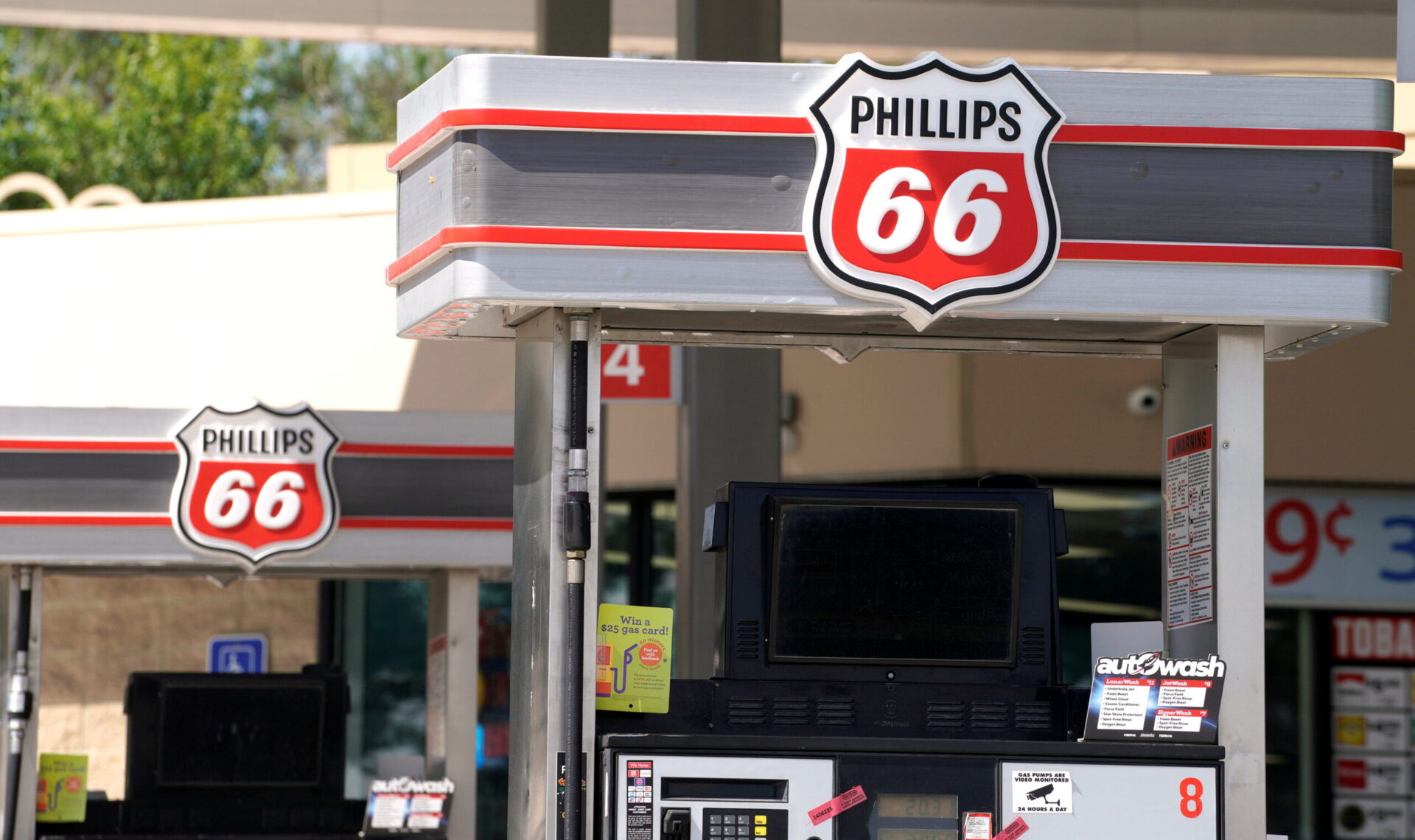Phillips 66 is a multinational energy company that operates in various segments of the oil and gas industry. The company was founded in 2012 and is headquartered in Houston, Texas. The company’s name is derived from the molecular weight of pure hexane, which is 66.
Phillips 66 operates in four main segments: refining, marketing, chemicals, and midstream.
The refining segment includes the processing of crude oil into various petroleum products, such as gasoline, diesel fuel, jet fuel, and lubricants. The company operates 13 refineries in the United States and Europe, with a total capacity of approximately 2.2 million barrels per day.
The marketing segment includes the sale of refined petroleum products through various channels, including branded retail outlets, commercial and industrial customers, and wholesale distributors. Phillips 66 operates approximately 7,000 retail fuel sites in the United States, Europe, and Asia.
The chemicals segment includes the manufacturing and marketing of various chemicals and plastics, including aromatics, olefins, and polymers. Phillips 66 operates several petrochemical manufacturing facilities in the United States and Europe.
The midstream segment includes the transportation, storage, and processing of crude oil, natural gas, and natural gas liquids. Phillips 66 owns and operates various pipeline systems, storage facilities, and processing plants in the United States.
Phillips 66 is committed to sustainability and has set several environmental goals, including reducing greenhouse gas emissions, increasing the use of renewable energy, and improving energy efficiency.
Overall, Phillips 66 is a major player in the global energy industry, with a diverse portfolio of operations and a commitment to sustainable practices.
History of Phillips 66
Phillips 66 has a rich history that dates back to the early 20th century. The company was founded in 1917 as Phillips Petroleum Company by brothers Frank and L.E. Phillips in Bartlesville, Oklahoma. The company began as a small oil and gas exploration and production company, but quickly expanded into other areas of the energy industry.
In the 1920s and 1930s, Phillips Petroleum developed a reputation for innovation, introducing several new products and technologies to the industry. In 1927, the company developed a process for producing high-octane gasoline, which became the industry standard. In 1933, the company introduced Phillips 66 gasoline, which was marketed as a premium fuel and quickly became a household name.
During World War II, Phillips Petroleum played a key role in the war effort, supplying fuel and other materials to the military. After the war, the company continued to expand, building new refineries and other facilities around the world.
In the 1950s and 1960s, Phillips Petroleum continued to innovate, developing new products and technologies, including the first commercial propane dehydration plant and the first high-density polyethylene plant. The company also began to diversify, entering the plastics and chemicals markets.
In the 1970s and 1980s, Phillips Petroleum faced several challenges, including the oil embargo of the 1970s and a major refinery explosion in 1989. However, the company continued to innovate and expand, building new refineries and expanding its chemical operations.
In 2002, Phillips Petroleum merged with Conoco to form ConocoPhillips, one of the largest oil and gas companies in the world. However, in 2012, ConocoPhillips spun off its refining and marketing operations into a separate company, which was named Phillips 66.
Since its spin-off, Phillips 66 has continued to grow and innovate, expanding its operations in refining, marketing, chemicals, and midstream. The company has also made significant investments in renewable energy and sustainable practices, including the development of biofuels and the implementation of energy efficiency measures at its facilities.
Products and Services of Phillips 66
Phillips 66 is a multinational energy company that operates in various segments of the oil and gas industry. The company offers a wide range of products and services, including:
Refining: Phillips 66 operates 13 refineries in the United States and Europe, with a total capacity of approximately 2.2 million barrels per day. The company’s refineries process crude oil into various petroleum products, including gasoline, diesel fuel, jet fuel, and lubricants.

Marketing: Phillips 66 markets refined petroleum products through various channels, including branded retail outlets, commercial and industrial customers, and wholesale distributors. The company operates approximately 7,000 retail fuel sites in the United States, Europe, and Asia, under various brands such as Phillips 66, Conoco, and 76.
Chemicals: Phillips 66 manufactures and markets various chemicals and plastics, including aromatics, olefins, and polymers. The company operates several petrochemical manufacturing facilities in the United States and Europe, producing products used in a wide range of industries, including automotive, construction, and consumer goods.
Midstream: Phillips 66 provides transportation, storage, and processing services for crude oil, natural gas, and natural gas liquids. The company owns and operates various pipeline systems, storage facilities, and processing plants in the United States, helping to transport and store energy products from production sites to refineries and markets.
In addition to these core products and services, Phillips 66 has also made significant investments in renewable energy and sustainable practices. The company is developing biofuels made from non-food sources such as wood chips and switchgrass, and is also implementing energy efficiency measures at its facilities to reduce greenhouse gas emissions. Phillips 66 is committed to promoting sustainability across its operations and throughout the energy industry.
Mergers and Acquisitions (M&A) of Phillips 66
Phillips 66 is a diversified energy manufacturing and logistics company that operates in various sectors of the energy industry, including refining, chemicals, midstream, and marketing. In recent years, Phillips 66 has engaged in several mergers and acquisitions (M&A) activities to expand its business operations and increase its market share.
One of the significant mergers of Phillips 66 was with Chevron Phillips Chemical Company LLC (CPChem), a joint venture between Chevron Corporation and Phillips 66, in 2020. Phillips 66 acquired full ownership of CPChem by buying out Chevron’s stake for $13 billion. The acquisition gave Phillips 66 complete control of CPChem’s portfolio of petrochemicals and plastics manufacturing facilities, which would increase Phillips 66’s revenue and market share in the petrochemicals industry.
In 2019, Phillips 66 also acquired Red Giant Oil Company, a lubricants and chemicals manufacturing company based in Oklahoma. The acquisition would help Phillips 66 expand its lubricants business and supply chain network.
In 2018, Phillips 66 completed the acquisition of a 70% stake in the natural gas liquids (NGL) logistics system of Canada’s Pembina Pipeline Corporation. The acquisition enabled Phillips 66 to expand its midstream operations and increase its access to the growing NGL markets.
In summary, Phillips 66’s M&A activities have been focused on expanding its business operations and increasing its market share in the energy industry. These acquisitions have enabled the company to diversify its product offerings and expand its supply chain network to reach new markets.
Brand Campaigns of Phillips 66
As part of its marketing strategy, the company has run various brand campaigns aimed at promoting its brand and products to its target audience.
One of the recent brand campaigns of Phillips 66 is the “Drive Savvy” campaign. The campaign aims to educate consumers on how to improve fuel efficiency and save money on gas. The campaign features a series of advertisements, social media posts, and interactive online tools that provide tips on how to save fuel while driving. The campaign also includes a loyalty program that rewards customers with discounts on gas purchases.
Another brand campaign of Phillips 66 is the “Live to the Full” campaign. The campaign focuses on the company’s commitment to safety, sustainability, and community involvement. The campaign features a series of advertisements that showcase Phillips 66’s safety record, environmental initiatives, and community outreach programs. The campaign also includes a website that provides information on the company’s safety and sustainability practices, as well as its community involvement efforts.
Phillips 66 has also run several brand campaigns focused on its various product lines. For example, the company’s “Cleaner and Greener” campaign promotes its line of cleaner-burning gasoline and diesel fuels. The campaign features advertisements that highlight the benefits of using these fuels, such as reduced emissions and improved engine performance. Another campaign, “Phillips 66 Lubricants,” promotes the company’s line of high-performance lubricants for cars, trucks, and industrial equipment. The campaign includes advertisements that showcase the benefits of using these lubricants, such as longer engine life and improved equipment performance.
In conclusion, Phillips 66 has run various brand campaigns aimed at promoting its brand and products to its target audience. These campaigns have focused on topics such as fuel efficiency, safety, sustainability, and community involvement, as well as promoting the company’s various product lines. Through these campaigns, Phillips 66 has been able to engage with its customers and build a positive brand image.
SWOT Analysis of Phillips 66
A SWOT analysis of the company can provide insights into its strengths, weaknesses, opportunities, and threats.
Strengths:
Diversified Business Model: Phillips 66 has a diversified business model, with operations across the entire oil and gas value chain, including exploration, production, refining, marketing, and distribution. This diversification allows the company to mitigate risks associated with fluctuations in any one area of the industry.
Strong Brand Recognition: Phillips 66 is a well-established brand with a long history of providing high-quality products and services to its customers. The company’s brand recognition and reputation have helped it to build a loyal customer base and establish a strong position in the market.
Operational Excellence: Phillips 66 has a strong track record of operational excellence, which is reflected in its safety record, environmental performance, and efficiency in refining and distribution operations. This has helped the company to maintain a competitive edge in the industry.
Strong Financial Position: Phillips 66 has a strong financial position, with a healthy balance sheet and a solid cash flow. This provides the company with the flexibility to invest in growth opportunities and weather economic downturns.
Weaknesses:
Exposure to Commodity Prices: As an energy company, Phillips 66 is heavily exposed to fluctuations in commodity prices. This can have a significant impact on the company’s profitability and financial performance.
Dependence on Refining Operations: The company’s refining operations generate a significant portion of its revenue. This dependence on refining operations can leave the company vulnerable to disruptions in the refining industry, such as changes in government regulations or supply chain issues.
Limited Geographic Reach: Phillips 66 has a limited geographic reach, with most of its operations focused in North America. This can limit the company’s growth potential and leave it vulnerable to changes in regional economic conditions.
Opportunities:
Growth in Emerging Markets: Phillips 66 has the opportunity to expand its operations in emerging markets, where demand for oil and gas products is growing rapidly.
Renewable Energy: The shift towards renewable energy sources presents an opportunity for Phillips 66 to diversify its business and expand into new markets.
Digital Transformation: The use of technology and data analytics can help it to optimize its operations, reduce costs, and improve efficiency.
Threats:
Intense Competition: The oil and gas industry is highly competitive, with numerous players vying for market share. This can put pressure on it’s pricing power and profitability.
Government Regulations: Changes in government regulations, such as environmental or safety regulations, can have a significant impact on the company’s operations and financial performance.
Economic Downturns: Economic downturns can lead to a decline in demand for oil and gas products, which can impact Phillips 66’s revenue and profitability.
In conclusion, the company has a strong brand and diversified business model, but it is exposed to fluctuations in commodity prices and government regulations. The company has opportunities to expand its operations in emerging markets, renewable energy, and digital transformation, but it also faces intense competition and economic uncertainty.
Also Read: Valero Energy: A Leader in Energy Innovation, Sustainability, and Growth
Future of Phillips 66
The future of the energy giant will depend on several factors, including trends in the energy industry, advancements in technology, and the company’s ability to adapt to changing market conditions. Here are some potential opportunities and challenges that could impact the future:
Shift towards Renewable Energy: As the world moves towards more sustainable and renewable energy sources, it may need to diversify its business and expand into new markets. The company has already invested in renewable fuels and has partnered with other companies to develop new technologies. In the future, the behemoth may need to continue to invest in renewable energy to remain competitive in the industry.
Advancements in Technology: The use of technology and data analytics can help the company to optimize its operations, reduce costs, and improve efficiency. The company has already implemented various digital transformation initiatives, such as the use of automation and artificial intelligence in its refineries. In the future, it may need to continue to embrace new technologies to stay ahead of the curve.
Environmental and Regulatory Pressures: Governments and consumers are placing increasing pressure on companies to reduce their carbon footprint and adopt more sustainable practices. It will need to continue to meet these demands by reducing emissions and investing in clean technologies.
Fluctuations in Commodity Prices: As an energy company, the organization is heavily exposed to fluctuations in commodity prices. In the future, the company will need to continue to manage these risks by diversifying its business and focusing on operational excellence.
Emerging Markets: The energy industry is experiencing strong growth in emerging markets, such as Asia and Africa. It has the opportunity to expand its operations in these regions and tap into new sources of demand for its products.
Competition: The energy industry is highly competitive, with numerous players vying for market share. Phillips 66 will need to continue to differentiate itself from its competitors and maintain its position as a leading player in the industry.
In conclusion, the future of the company will depend on its ability to adapt to changing market conditions, invest in renewable energy and new technologies, and meet the demands of consumers and governments for more sustainable practices. The company will also need to continue to manage its exposure to commodity prices and compete with other players in the industry. By leveraging its strengths and addressing its weaknesses, the energy company can position itself for success in the years ahead.
To read more content like this, subscribe to our newsletter



